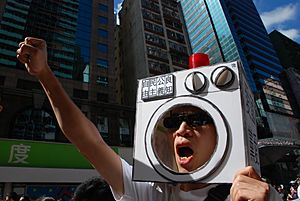Mind control facts for kids
Mind control (also known as brainwashing or thought control) is a way some people try to control what others believe and how they act. It's a process where a group or person uses certain methods to make others change their basic beliefs and values. These methods can sometimes be unfair or unethical and might harm the person being controlled.
The idea of mind control often refers to any tactic, whether it's about feelings or other things, that takes away a person's control over their own thoughts, actions, feelings, or choices.
Theories about brainwashing and mind control first came about to explain how governments that control everything (called totalitarian regimes) seemed to successfully teach their ideas to prisoners of war using propaganda (spreading ideas) and other strong methods.
Contents
Brainwashing in the Korean War
The word brainwashing was first used in an article by Edward Hunter in 1950 during the Korean War. Hunter, who was a journalist and later a U.S. intelligence agent, wrote about how the Chinese were using "brainwashing."
The Chinese term for this was 洗腦 (xǐ năo), which literally means "wash brain." It described methods used in China to change people's mindset so they would think and act in ways that fit the new Chinese social system.
Hunter and others used this term to explain why many American soldiers, who became prisoners of war during the Korean War, seemed to switch sides. Some British soldiers also said they were subjected to brainwashing while they were prisoners.
Mind Control and New Religious Groups
After the Korean War, the idea of mind control started to be used more to talk about religion instead of just politics. From the 1960s, more young people began joining new religious movements (NRMs).
Some people who joined these groups suddenly changed their beliefs and actions a lot, sometimes even losing touch with their families. People who were against these groups said these sudden changes were due to mind control. Some psychologists (people who study the mind) developed ideas about how brainwashing might work in these situations. However, many social scientists who study society were not sure if mind control truly explained why people joined these groups.
History of Mind Control Ideas
Some experts say that the ideas behind mind control have been around throughout history. They are like very strong versions of techniques used for religious conversion and propaganda, which have always been common in human history.
Images for kids
-
Laurence Harvey and Frank Sinatra in The Manchurian Candidate
See also
 In Spanish: Lavado de cerebro para niños
In Spanish: Lavado de cerebro para niños






